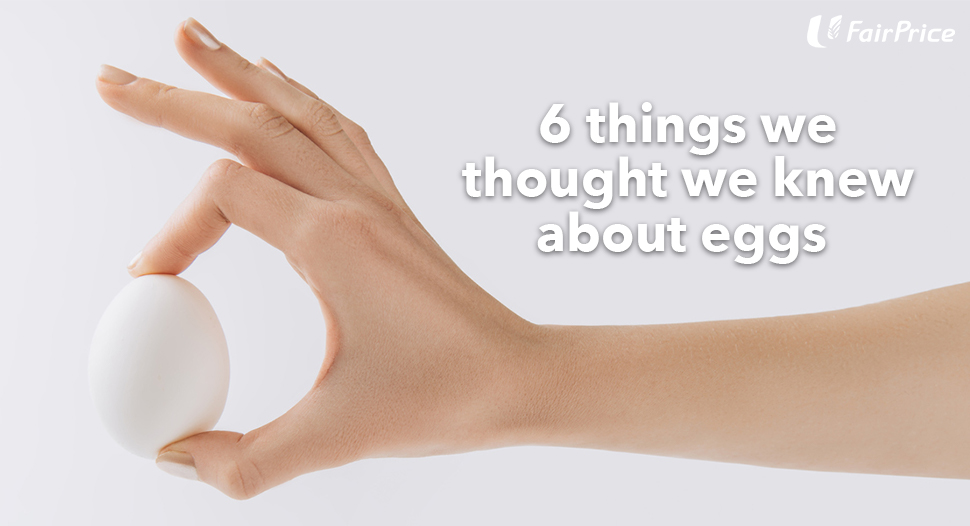We think we know everything about our eggs, but some of what we think we knew might just happen to be fake news!
Do you judge your eggs by the colour of their shell? Has anyone ever attempted to rub your bruises away with a hard-boiled egg? Do you stand your eggs pointy side up? We help you crack some myths with some fresh facts that might even help you keep your eggs fresher for longer!
Myth 1: Brown eggs are better than white eggs, or vice versa
Fact: You can’t judge an egg by the colour of its shell. Eggs can come in different colours, but there’s no difference in composition, quality or nutritional value between a white egg or a brown egg¹. The only exception is rainbow eggs, which appear only during a certain time of the year, can sometimes contain chocolate, and probably come from a whole different animal altogether.


Myth 2: Boiled eggs can rub away bruises
Fact: You may remember your mother rubbing a still-hot hard-boiled egg onto your bruises when you were a child; some mums may have peeled away the shell, others would have left it on. There was even a case in 2016 of a food stall assistant who tried to treat a colleague who burned his back by cracking a raw egg onto his wound.
There’s no medical evidence that supports the idea that eggs, whether hard-boiled or raw, can automatically rub away bruises or burns². You may end up worsening the wound, or even introducing an infection to the affected area. In such cases, it’s best to just apply a good old ice-pack wrapped in a towel, or in the case of burn wounds, use burn cream.
Myth 3: Orange yolks good, yellow yolks bad
Fact: The colour of egg yolks have much more to do with what the chicken is eating than the egg’s actual quality, and neither is it an indicator of whether the chicken is running free in a kampung or stuck in a coop. The saturation of an egg’s yolk is dependent on the amount of carotenoids in a chicken’s diet, so you’re more likely to get richer-coloured yolks from a tray of carrot eggs or corn-fed eggs, but eggs with lighter-coloured yolks are really just as good.
Myth: The sharp end of the egg faces should point upwards
Fact: If you look at the eggs sitting in our supermarket shelves, you should find all of them are sitting in their cartons round side up. When you peel a hard-boiled egg, you’ll also find that there’s usually a pocket of air at its round end. When an egg is placed round end up, that air pocket will help keep the egg’s yolk centered within its shell, thus keeping the egg fresh longer.
After a lifetime of seeing images of eggs with their pointy ends up, we’ve all been led to believe that’s how we should keep our eggs, when it’s really supposed to be the other way round. Well, at least now we’ve cracked it.
Myth: Eggs give you high cholesterol
Fact: Eggs are really the most nutritious superfoods you can get to fit in the palm of your hand. But for many years, the humble egg—specifically its yolk—was misunderstood to be a cholesterol bomb that was bad for the heart. Research now shows that the cholesterol we eat will only slightly increase the cholesterol in our blood because our body naturally regulates our cholesterol levels, and that your blood cholesterol is more likely to be affected by consuming products with saturated fats and trans fats.
Of course, as with all things, moderation is key. The Heath Promotion Board’s advice is for individuals to consume less than 4 egg yolks a week, though having one or two eggs a day shouldn’t significantly increase your cholesterol either. But if you have a pre-existing medical condition such as high cholesterol or diabetes, best consult your doctor for your recommended intake.
Myth: Eggs last longer chilled
Fact: In Singapore, the Singapore Food Agency (SFA) does advise us to store our eggs in the fridge in order to prolong their shelf life. Normal eggs can last more than a week when stored in room temperature, but if chilled, can be used within three to five weeks from its date of purchase or receipt, while eggs with pasteurised shells can last up to 60 days in the fridge.
Bonus Fact: The egg trays you see designed into your fridge door aren’t really the best places to store your eggs, because the doors happen to be the warmest part of the refrigerator, and they’re also where the temperature fluctuates the most through opening and closing. Your eggs, whatever colour they may be, are best kept in the carton they came in, round side up, in the middle shelf of your fridge instead.
Have you been raising your omelette-making game recently? Share your luxuriously levelled up egg dish and recipe in our #FPLiftUpEverydayChallenge, now on to 28 April 2021, and stand a chance to win up to $3,000* worth of FairPrice Gift Cards! Terms & conditions apply; visit https://www.fairprice.com.sg/events/in-store/lift-up-everyday for more details.
***
References:
– Jones, Taylor (RD), Healthline. Brown vs White Eggs — Is There a Difference?, viewed 17 March 2021
– New Paper. Cracking eggs on burn wounds can lead to infection, viewed 17 March 2021
– Chandra, Anjana M. First Aid Home Remedies: 5 Myths and Facts, viewed 17 March 2021
– Lip Ping, Low (Dr). Eggs and Cholesterol, viewed 17 March 2021
– HealthHub. Q&A: Expired Supplements and Eggs in Diet, viewed 17 March 2021
– Singapore Food Agency. Eggs – To refrigerate or not?, viewed 17 March 2021
– National Environment Agency. Choosing Your Eggs Wisely, viewed 26 March 2021
– Egg Story. Pasteurised Shell Eggs: FAQ, viewed 17 March 2021
– Liles, Maryn. 5 Things You Don’t Know About Storing Eggs, viewed 17 March 2021



